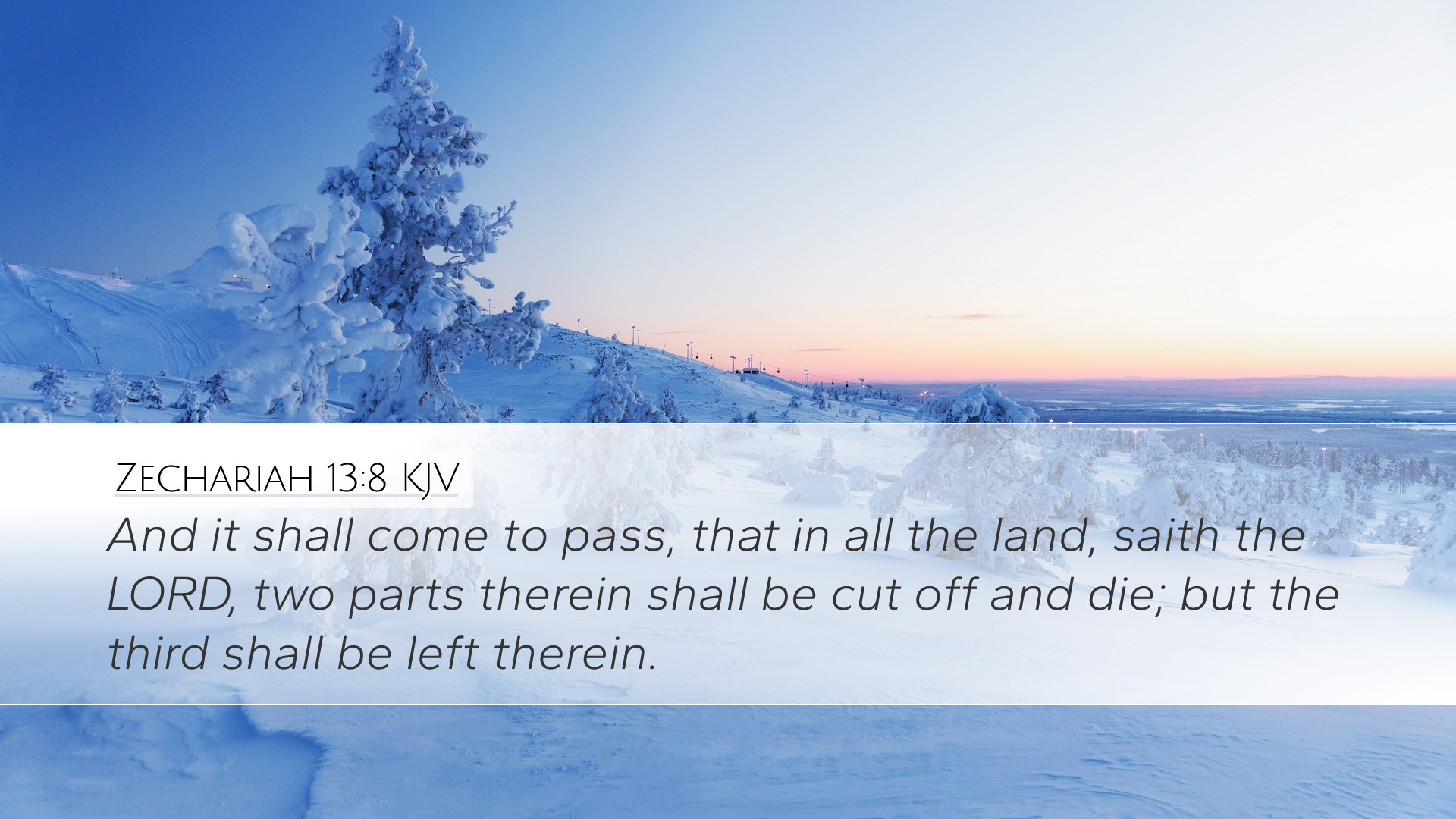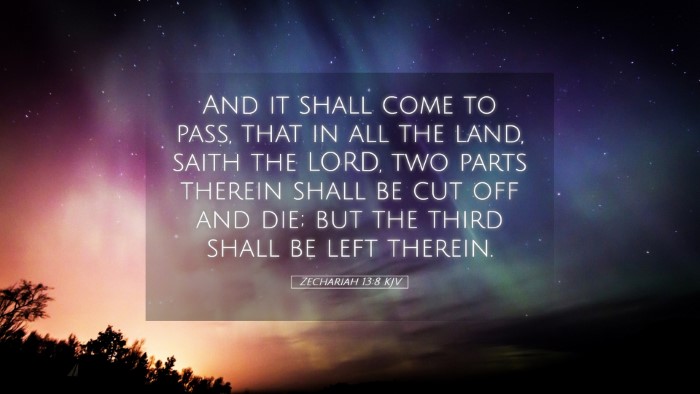Old Testament
Genesis Exodus Leviticus Numbers Deuteronomy Joshua Judges Ruth 1 Samuel 2 Samuel 1 Kings 2 Kings 1 Chronicles 2 Chronicles Ezra Nehemiah Esther Job Psalms Proverbs Ecclesiastes Song of Solomon Isaiah Jeremiah Lamentations Ezekiel Daniel Hosea Joel Amos Obadiah Jonah Micah Nahum Habakkuk Zephaniah Haggai Zechariah MalachiZechariah 13:8
Zechariah 13:8 KJV
And it shall come to pass, that in all the land, saith the LORD, two parts therein shall be cut off and die; but the third shall be left therein.
Zechariah 13:8 Bible Commentary
Commentary on Zechariah 13:8
Zechariah 13:8 states: "And it shall come to pass, that in all the land, saith the LORD, two parts therein shall be cut off and die; but the third shall be left therein." This verse addresses a profound and difficult prophecy regarding the fate of the people of Israel, particularly as it relates to purity and judgment.
Contextual Analysis
To fully appreciate the significance of this passage, it is essential to understand its context within the prophetic writings of Zechariah. This prophetic book serves as a pivotal point in the history of Israel's return from exile, offering both hope and warnings. Zechariah addresses a struggling community attempting to rebuild their identity and relationship with God.
Exposition of the Verse
- The Land: The reference to "all the land" underscores a widespread condition affecting the entirety of Israel. The implication here is that God's judgment is not singular but rather pervasive, affecting all inhabitants.
- The Two Parts: The phrase “two parts therein shall be cut off and die” can be viewed as a metaphorical and literal judgment. Matthew Henry notes that this division symbolizes the fate of a vast number of people who choose rebellion against God instead of faithfulness.
- The Third Part: The third part that remains is emblematic of a remnant—the faithful ones who will be preserved through trials. This serves as a critical theme throughout prophetic literature, symbolizing divine grace amidst judgment.
Theological Implications
From a theological perspective, this verse touches on several key themes:
- Judgment and Mercy: The duality of judgment (the two parts) contrasted with mercy (the one part) reflects the nature of God’s dealings with humanity. Adam Clarke emphasizes that God's judgment is always tempered with mercy; thus, while great suffering is foretold, there remains a glimmer of hope through the remnant.
- Refinement through Trials: The notion that the remnant will be “refined” (as noted in subsequent verses) speaks to the process of sanctification God employs to purify His people. Albert Barnes comments on the trials faced by believers as a means for deeper intimacy with God.
- Faithfulness amid Adversity: The enduring existence of the remnant conveys a powerful message about faithfulness amidst adversity, encouraging modern believers to trust in God’s plan even when circumstances appear bleak.
Application for Contemporary Believers
This scripture not only pertains to historical Israel but also reverberates into the present day and challenges believers to reflect on their faith walks:
- Examine One's State: The exhortation to self-examination resonates throughout Scripture. Believers are called to consider which 'part' they may be in, particularly in contexts of faithfulness versus unfaithfulness.
- Hope in God’s Remnant: The promise of preservation for a remnant encourages believers to remain steadfast in faith. This remnant reflects the Body of Christ, and in this, there is a call to unity and support among believers.
- Call to Evangelism: The harsh reality of judgment serves as a potent reminder of the urgency for evangelism. Believers are reminded that witnessing to others is not merely an act of obedience but a means of potentially saving souls from judgment.
Conclusion
Zechariah 13:8 presents a sobering but necessary illustration of God’s holiness and the seriousness of rebellion against Him. As noted by all three commentators, the passage emphasizes the concept of a remnant that will endure—symbolizing hope amidst judgment. For contemporary believers, understanding this prophecy encourages not only introspection about one's faith journey but also inspires a collective responsibility towards a faithful witness in a world that often strays from God’s call.


